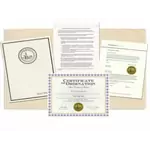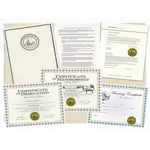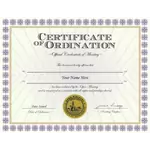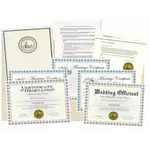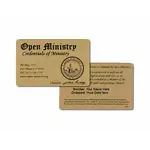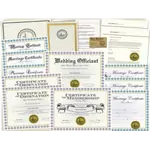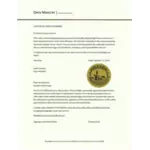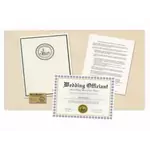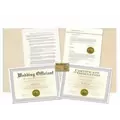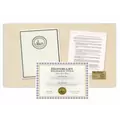State Marriage Laws and Information
Since 2010, Open Ministry has been ordaining and helping people all over the world perform weddings, ceremony and other sacerdotal duties. This page focuses on requirements and information for Oklahoma; Scroll down to the bottom of the page for links to other states.
How to get ordained and perform a wedding in Oklahoma
If you are planning to get ordained in Oklahoma or you have been asked to perform a wedding ceremony in Oklahoma, or simply need to to find an ordained minister in Oklahoma to perform your wedding ceremony.
This ordination information forOklahoma is provided below in an easy five step layout which is designed help walk you through the most common steps on registering to become a minister for Oklahoma and how perform a wedding ceremony in Oklahoma.
Step 1 - Get Ordained Online for free with Open Ministry
Step 1: Get Ordained in Oklahoma with Open Ministry
Start your journey as an ordained minister in Oklahoma with Open Ministry’s free, fully digital ordination process. Most applicants receive their confirmation email within 24 hours; printed hard copies are available for a nominal charge, so you’ll be ready to officiate ceremonies statewide!
When you get ordained in Oklahoma through Open Ministry, you’ll enjoy:
- Free ordination - no fees, no delays.
- Emailed confirmation - arrive in minutes.
- Printed certificates available - visit our bookstore for details.
- Full officiation privileges - weddings, vow renewals, and more.
- Trusted since 2010 - join thousands across Oklahoma.
How It Works
- Hit the Get Ordained in Oklahoma link.
- Fill in your details on our secure form.
- Receive your digital confirmation by email; order printed certificates if you wish.
With your Open Ministry credentials, you’ll be a legally recognized minister in Oklahoma, able to preside over wedding ceremonies anywhere in the state.
Begin Your Oklahoma Ordination
100% free ordination online-printed certificates available for a small reasonable fee.
Step 2 - Contact The County Clerk
How to Register to Officiate a Marriage in Oklahoma
Next, contact the office of your local marriage authority (typically your county clerk in Oklahoma). Let them know that you are a ordained minister with Open Ministry in California, and ask them what information the will require of you, to officiate a marriage in Oklahoma. Most clerks and governing agencies may require that you present them with a physical copy of your ordination record.
When speaking with the county clerk; it can be helpful to use the following phrases.
- What agency or department issues marriage licenses in your county and how may I contact them?
- I am an ordained minister with a church in California and I would like to register as a wedding Officiant in your county to perform and solemnize weddings.
- I have my Letter of Good Standing and/or Ordination Credential as proof of my ministry and ordination.
- What additional documentation is required for me to register as a wedding Officiant in your county or state?
Step 3 - Get registered to perform a Marriage
License to perform a wedding in Oklahoma
After you've contacted your marriage authority, you will want to visit our bookstore to get physical copies official credentials for presentation and your records. (See Oklahoma State Statutes for More Specific Requirements )
When registering in Oklahoma you may be asked to display proof of your ordination to the county clerk's before they will accept the marriage license as having been legally solemnized. We typically advise ministers of Oklahoma to get a Complete Minister Package for Oklahoma which includes your Letter of Good Standing (the live signed and notarized physical copy of your standing with our ministry).
Having your physical copies credentials provides peace-of-mind to couples and others that you intend to marry. Additionally, we recommend at least 4 weeks between the date of the wedding ceremony and your order, to ensure that you receive all of your materials and are able to register in time. Please note that every state and county can impose different requirements. This may include other nominal fees and additional paperwork that may need to be completed before the ceremony can take place.
It is important to note that some county clerks in Oklahoma may require wedding officiants to attach a statement which asserts some of the elements in the marriage license upon submission, including the following:
- The time and location at which the wedding took place
- The names and places of residence of all official witnesses
- The religious organization in which the officiant is ordained
- The printed name and address of the officiant
Please note that, when filling out a marriage license, that Oklahoma State may request you use the title "Minister" or "Reverend". The County Clerks may also require you enter your denomination, you can use "Non-Denominational". Failing to state a denomination may result in rejection and could require a duplicate marriage license.
Step 4 - How to Perform the Wedding
How to perform a wedding in Oklahoma
Once you have completed of the above, you are ready to perform the wedding! Be sure that the couple has picked up their Oklahoma state issued marriage license from the appropriate office. Oklahoma marriage licenses valid for a set number of days, and there may be a waiting period between when the couple receives the marriage license in Oklahoma and when the ceremony may be legally performed in Oklahoma. This information should be written on the license and followed to ensure the ceremony is recorded properly.
Please be aware that the signed license must be returned to the issuing office in Oklahoma before the time limit is reached. Check the marriage license for the exact dates. Once the the previous matters have been addressed, officiating a wedding in Oklahoma can be a great and wonderful experience.
If you have any comments or issues as a wedding officiant in Oklahoma, or after you have been ordained, or would like to just asking for guidance on how to perform a wedding ceremony in Oklahoma. We recommend that all new Oklahoma wedding ministers who have issues or concerns about the ceremony read over our helpful guides.
Oklahoma
43-7 Solemnization of marriages; production of license; penalty; registration of persons authorized to solemnize marriages
A. All marriages must be contracted by a formal ceremony performed or solemnized in the presence of at least two adult, competent persons as witnesses, by a judge or retired judge of any court in this state, or an ordained or authorized preacher or minister of the Gospel, priest or other ecclesiastical dignitary of any denomination who has been duly ordained or authorized by the church to which he or she belongs to preach the Gospel, or a rabbi and who is at least eighteen (18) years of age.
B. 1. The judge shall place his or her order of appointment on file with the office of the court clerk of the county in which he or she resides.
2. The preacher, minister, priest, rabbi, or ecclesiastical dignitary who is a resident of this state shall have filed, in the office of the court clerk of the county in which he or she resides, a copy of the credentials or authority from his or her church or synagogue authorizing him or her to solemnize marriages.
3. The preacher, minister, priest, rabbi, or ecclesiastical dignitary who is not a resident of this state, but has complied with the laws of the state of which he or she is a resident, shall have filed once, in the office of the court clerk of the county in which he or she intends to perform or solemnize a marriage, a copy of the credentials or authority from his or her church or synagogue authorizing him or her to solemnize marriages.
4. The filing by resident or nonresident preachers, ministers, priests, rabbis, ecclesiastical dignitaries or judges shall be effective in and for all counties of this state; provided, no fee shall be charged for such recording.
C. No person herein authorized to perform or solemnize a marriage ceremony shall do so unless the license issued therefor be first delivered into his or her possession nor unless he or she has good reason to believe the persons presenting themselves before him or her for marriage are the identical persons named in the license, and for whose marriage the same was issued, and that there is no legal objection or impediment to such marriage.
D. Marriages between persons belonging to the society called Friends, or Quakers, the spiritual assembly of the Baha'is, or the Church of Jesus Christ of Latter Day Saints, which have no ordained minister, may be solemnized by the persons and in the manner prescribed by and practiced in any such society, church, or assembly.
Title 43: Husband and Wife
R.L. 1910, § 3889. Amended by Laws 1951, p. 113, § 1; Laws 1961, p. 285, § 1; Laws 1971, c. 298, § 1, emerg. eff. June 24, 1971; Laws 1986, c. 24, § 1, eff. Nov. 1, 1986; Laws 1989, c. 333, § 3, eff. Nov. 1, 1989; Laws 1998, c. 214, § 1, eff. Nov. 1, 1998; Laws 1999, c. 305, § 1, emerg. eff. June 4, 1999.
43-7 Solemnization of marriages; production of license; penalty; registration of persons authorized to solemnize marriages
A. All marriages must be contracted by a formal ceremony performed or solemnized in the presence of at least two adult, competent persons as witnesses, by a judge or retired judge of any court in this state, or an ordained or authorized preacher or minister of the Gospel, priest or other ecclesiastical dignitary of any denomination who has been duly ordained or authorized by the church to which he or she belongs to preach the Gospel, or a rabbi and who is at least eighteen (18) years of age.
B. 1. The judge shall place his or her order of appointment on file with the office of the court clerk of the county in which he or she resides.
2. The preacher, minister, priest, rabbi, or ecclesiastical dignitary who is a resident of this state shall have filed, in the office of the court clerk of the county in which he or she resides, a copy of the credentials or authority from his or her church or synagogue authorizing him or her to solemnize marriages.
3. The preacher, minister, priest, rabbi, or ecclesiastical dignitary who is not a resident of this state, but has complied with the laws of the state of which he or she is a resident, shall have filed once, in the office of the court clerk of the county in which he or she intends to perform or solemnize a marriage, a copy of the credentials or authority from his or her church or synagogue authorizing him or her to solemnize marriages.
4. The filing by resident or nonresident preachers, ministers, priests, rabbis, ecclesiastical dignitaries or judges shall be effective in and for all counties of this state; provided, no fee shall be charged for such recording.
C. No person herein authorized to perform or solemnize a marriage ceremony shall do so unless the license issued therefor be first delivered into his or her possession nor unless he or she has good reason to believe the persons presenting themselves before him or her for marriage are the identical persons named in the license, and for whose marriage the same was issued, and that there is no legal objection or impediment to such marriage.
D. Marriages between persons belonging to the society called Friends, or Quakers, the spiritual assembly of the Baha'is, or the Church of Jesus Christ of Latter Day Saints, which have no ordained minister, may be solemnized by the persons and in the manner prescribed by and practiced in any such society, church, or assembly.
Title 43: Husband and Wife
R.L. 1910, § 3889. Amended by Laws 1951, p. 113, § 1; Laws 1961, p. 285, § 1; Laws 1971, c. 298, § 1, emerg. eff. June 24, 1971; Laws 1986, c. 24, § 1, eff. Nov. 1, 1986; Laws 1989, c. 333, § 3, eff. Nov. 1, 1989; Laws 1998, c. 214, § 1, eff. Nov. 1, 1998; Laws 1999, c. 305, § 1, emerg. eff. June 4, 1999.

